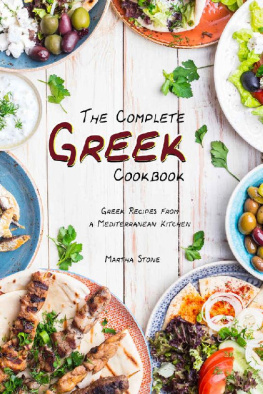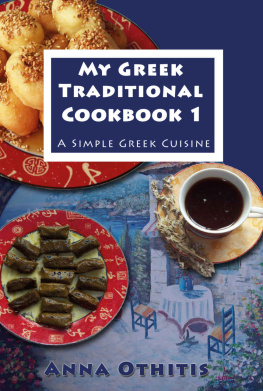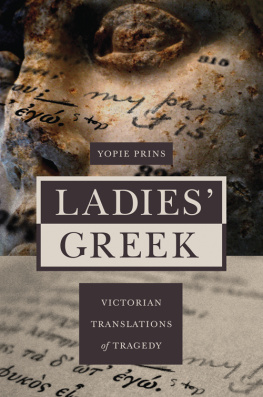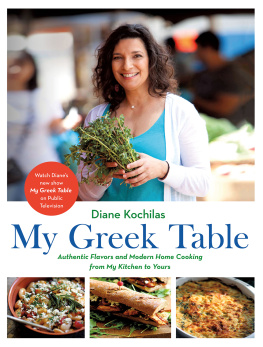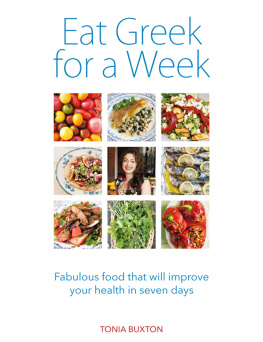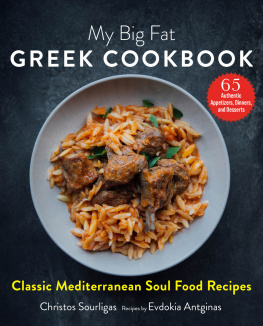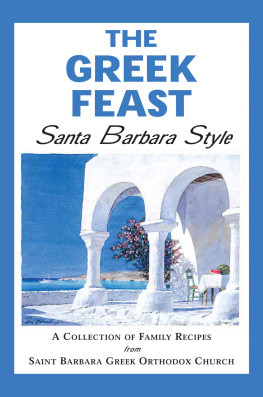About the Author
A native Greek who never lost her connections to her homeland, Katerina Katsarka Whitley is a mother and grandmother, a teacher, a public speaker and dramatist, a writer, a passionate cook, and a cooking instructor. Her freelance writing on Greek culture, food, and travel has appeared in the News and Observer , Catholic Middle East , Witness , and other religious journals, and in the Christian Science Monitor, where she also contributed literary essays. In addition to this, she taught at Appalachian State University. Katerina is deeply rooted in her religious community, having worked for over a decade with the Episcopal Church of New York, where she wrote speeches and sermons for bishops and priests. Today, she travels the country as a regular speaker at numerous Episcopal churches.
AROUND A GREEK TABLE
Dedicated to the Katsarka clan and all those who joined their lives with ours
To buy books in quantity for corporate use or incentives, call (800) 962-0973 or e-mail premiums@GlobePequot.com.
Copyright 2012 by Katerina Katsarka Whitley
ALL RIGHTS RESERVED. No part of this book may be reproduced or transmitted in any form by any means, electronic or mechanical, including photocopying and recording, or by any information storage and retrieval system, except as may be expressly permitted in writing from the publisher. Requests for permission should be addressed to Globe Pequot Press, Attn: Rights and Permissions Department, PO Box 480, Guilford, CT 06437.
Lyons Press is an imprint of Globe Pequot Press.
Photo on p. viii by Niki Craig.
Text design: Maggie Peterson
Layout artist: Maggie Peterson
Project editors: Gregory Hyman & Meredith Dias
Library of Congress Cataloging-in-Publication Data
Whitley, Katerina Katsarka.
Around a Greek table: Recipes and stories arranged according to the liturgical seasons of the Eastern Church / Katerina Katsarka Whitley ; photographs by Jasmin Hejazi.
p. cm.
ISBN 978-0-7627-7836-2
1. Cooking, Greek. 2. Food habitsGreece. 3. Orthodox Eastern ChurchLiturgy. 4. Cookbooks. I. Title.
TX723.5.G8W45 2012
641.59495dc23
2011035836
Printed in the United States of America
10 9 8 7 6 5 4 3 2 1
Acknowledgments
How far back may one go to give credit for nurturing and for showing that cooking is more than a daily chore? I will start with my grandmother, who kept us all together in her self-effacing manner, and my own mother, who left us too soon but whose memory is connected with some cherished images of her in the kitchen; and my stepmother, who also was a fine cook despite limited facilities. These three women showed me that caring for ones family is a great calling and that cooking for others is a ministry: Do all things as unto the Lord, St. Paul taught us . I want to thank my sister Doritsa who took over when our mother died and became a superb cook and mother in her own right, and my sister Niki who surprised us all with her flair for the finest in cuisine and entertaining. And my brothers wife, Soula, who entered a family of cooks to contribute her own excellent traditions in creative and tasty meals. These three beloved sisters gave me enthusiastic support for this book. To my niecesNatassa, Lydia, and Phoebewho entered into the venture of offering and suggesting recipes with gusto, my thanks with my love. And to all my Greek clan with whom I have broken bread through the yearsmany thanks for the meals and, above all, for the singing.
I especially remember the first editors who liked my food essays and published them: at the News and Observer, Garnet Bass, and my wonderful editors at the Christian Science Monitor in the 1980s. Thanks go to my agent, Kathleen Davis Niendorff, for believing in the project and my editor, Katie Benoit, for her enthusiasm and care with details. And special thanks to Eleni Melirrytou and the women of St. Barbara Greek Orthodox Church in Durham, North Carolina.
Above all to my own family, especially my husband, Rudy, who never complained as I learned and experimented, even in my days of ignorance in the kitchen, and my lovely daughters, Niki and Maria, who brought friends home to taste my cooking, and later their husbands and children. It is for the sake of these beloved and delightful children and grandchildren that I have written this book of Greek memories and recipes. Everything Mika cooks is filled with goodness, my second grandson, Jeremy, said. What can be a higher accolade?
Preface
I learned Greek history around our kitchen table. Together with the taste and smell of lemony sauces and the evocative flavor of onions and tomatoes sauted in olive oil, I absorbed my fathers stories of the Balkan wars, of World War I, of mans greed and treachery, of deprivations and courage. I also ingested a strong national pride together with oregano and cumin. I learned of my fathers original hometown in a land now Turkish and, though Ive never visited it, I can still see it as he painted it with words, sharing with me the flavors of the place he loved. His mother hailed from fabled Constantinople the Polis, as the Greeks proudly called it, still yearning for it in the middle of the twentieth centuryand from that place she brought to us the memories and tastes of rich Anatolian cooking.
At our table met the east and west of Greece. The Katsrka clan from Adrianople and Constantinople were from the east, but my mother, with the ancient and fateful name of Persephn, came from the west, from mountainous Epirus, bringing with her a hint of all the tragedies associated with the murderous Ali Pasha. She, an orphan, was taken from her hometown at four years of age, and the only memory she shared with us from that place was a sound she heard as a childthe creaking of the watermelons as they grew and expanded in the fields. The east and west met in Thessaloniki, and there the children of the union were nourished with stories as much as with food.
So together with recipes from my family and my own strong inclination to incorporate Greek flavors in new ways, I offer here stories and recipes of survival and simplicity in the midst of hard times; of earthy vegetable flavors that honor the soil that produced them; of meat and fish cooked with imagination; of legumes that contribute to good health; and of abundance and festivity that surround holidays.
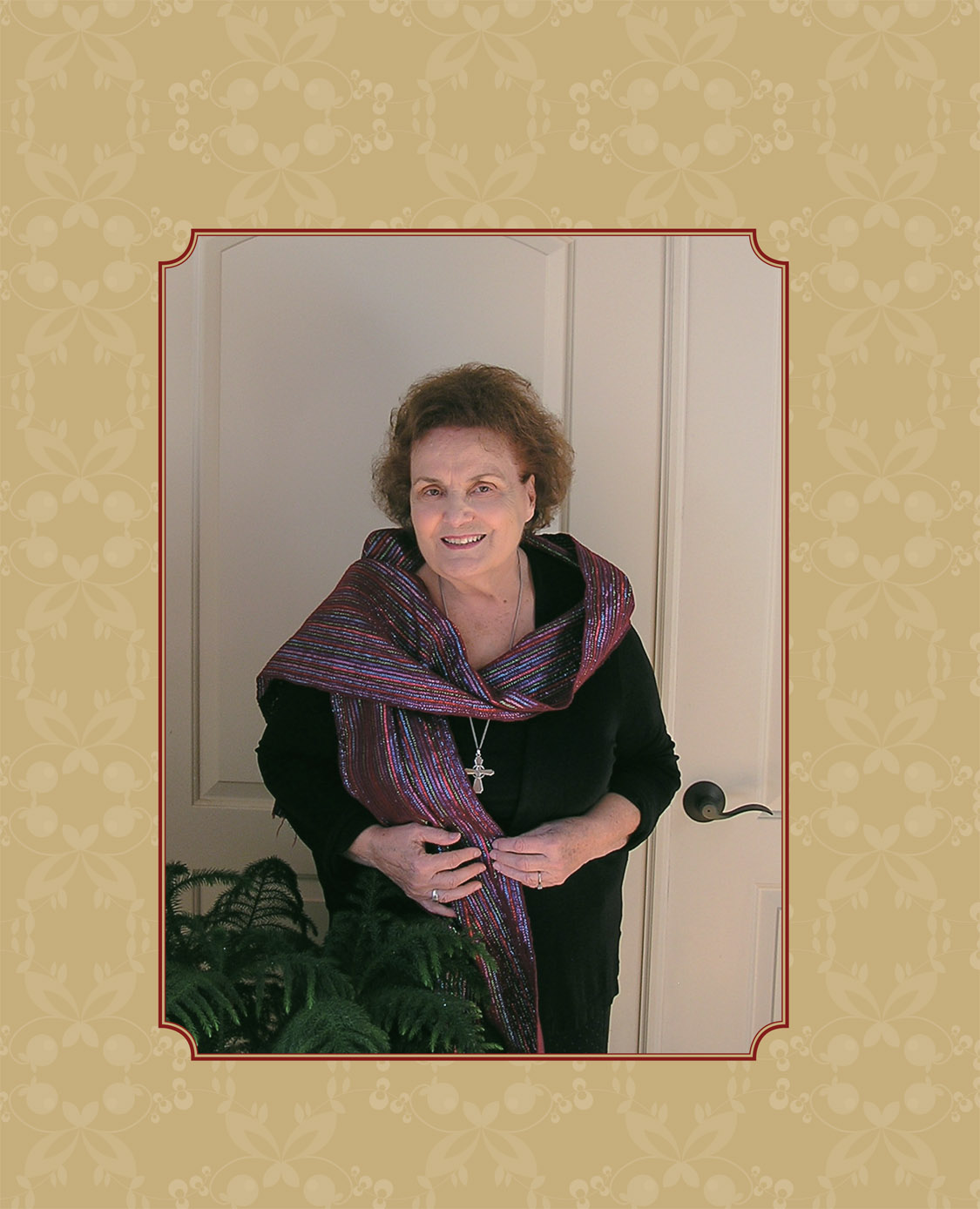
Around a Greek Table: Recipes Served with Flavors, Aromas, and Stories
C ooking was something my mother did. My fathers contribution to the kitchen was that he did most of the buying, especially poultry and fruit, and sliced the freshly bought bread for the main meal of the day. Mothers did not work outside the home when I was a child, so they spent much of the morning preparing for the main meal. Most everything they needed was available from vendors in the street. The woman was in charge of the kitchen then. My brother, Kostakis, expected to be waited on by his three sisters, and we spent much of our childhood being furious with him. Things have changed, of course, and now he waits on his wife and cleans up after she does the cooking. How nicely some things improve, even in old countries. As children, we girls helped by chopping nuts for baklava or by pouring the lemon juice as mother whipped avgolmono sauces. The rest of the time we were at school, or we studied, practiced the piano, or involved ourselves with the church gatherings that provided our only entertainment. There was a firm conviction in our unusual Greek household that childrens lives should not be burdened by household chores. Our schoolwork and play came first. The duties of adult life would arrive soon enough; for now, we were to excel in our studies. So I didnt learn to cook while at home. I observed, absorbed the cooking aromas, and ate the food provided.


